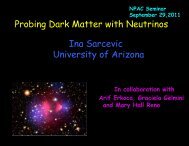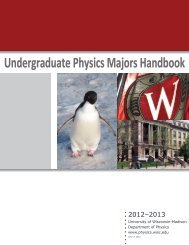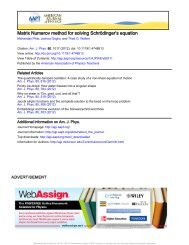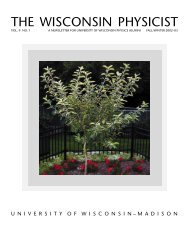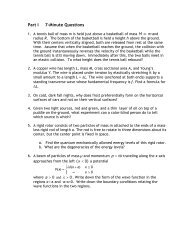Vol. 17 No. 1, 2012 - Physics Department - University of Wisconsin ...
Vol. 17 No. 1, 2012 - Physics Department - University of Wisconsin ...
Vol. 17 No. 1, 2012 - Physics Department - University of Wisconsin ...
You also want an ePaper? Increase the reach of your titles
YUMPU automatically turns print PDFs into web optimized ePapers that Google loves.
The <strong>Wisconsin</strong> Physicist<br />
<strong>Department</strong> <strong>of</strong> <strong>Physics</strong><br />
1150 <strong>University</strong> Avenue<br />
Madison, WI 53706<br />
Tel: 608.262.4526<br />
Email: info@physics.wisc.edu<br />
Web: www.physics.wisc.edu<br />
<strong>Vol</strong>. <strong>17</strong> <strong>No</strong>.1 Spring <strong>2012</strong>
Inside this Issue<br />
Greetings from the Chair .................................................... 2<br />
IceCube Neutrino Observatory: Construction &<br />
Collaboration ...................................................................... 3<br />
What’s New ........................................................................ 5<br />
The <strong>Physics</strong> Library .....................................................................5<br />
<strong>University</strong> Physical Society: UPS ..................................................5<br />
2011 <strong>Physics</strong> Award Banquet ............................................. 6<br />
Degrees Awarded ............................................................... 8<br />
Graduate Student Admissions ............................................ 9<br />
In Memoriam .................................................................... 10<br />
Foundation Accounts ........................................................ 11<br />
Giving ............................................................................... 12<br />
The <strong>Wisconsin</strong> Physicist 1<br />
<strong>Vol</strong>. <strong>17</strong> <strong>No</strong>.1 Spring <strong>2012</strong><br />
<strong>University</strong> <strong>of</strong> <strong>Wisconsin</strong><br />
<strong>Department</strong> <strong>of</strong> <strong>Physics</strong><br />
1150 <strong>University</strong> Avenue<br />
Madison, WI 53706<br />
Tel: 608.262.4526<br />
Fax: 608.262.3077<br />
Email: info@physics.wisc.edu<br />
Web: www.physics.wisc.edu<br />
Facebook: UW-Madison <strong>Department</strong> <strong>of</strong> <strong>Physics</strong><br />
On the Cover<br />
The IceCube Neutrino Observatory was completed<br />
at the South Pole on December 18, 2010. The date<br />
marks the end <strong>of</strong> construction and the beginning<br />
<strong>of</strong> full data-taking capacity for IceCube.
2 The <strong>Wisconsin</strong> Physicist<br />
View from the Chair, Pr<strong>of</strong>essor Robert Joynt<br />
Greetings<br />
I<br />
took over as Chair in September,<br />
2011 from Baha Balantekin. The<br />
department thanks Baha for his<br />
3 years <strong>of</strong> distinguished service and<br />
wishes him bon voyage to California<br />
and Japan, where he will be spending<br />
his well-earned sabbatical.<br />
2011 has been a year <strong>of</strong> transition for<br />
the <strong>Physics</strong> <strong>Department</strong>. Pr<strong>of</strong>s. Lou<br />
Bruch and Lynn Knutson have retired<br />
after many years <strong>of</strong> service, though<br />
both have remained actively present<br />
in the department. Pr<strong>of</strong>s. Teresa<br />
Montaruli and Tao Han resigned to<br />
take positions at the Universities <strong>of</strong><br />
Geneva and Pittsburgh, respectively.<br />
These people will be difficult<br />
to replace, but we are currently<br />
searching for three new faculty in<br />
plasma physics, high-energy theory,<br />
and high-energy astrophysics. We<br />
are pleased to announce that<br />
Assistant Pr<strong>of</strong>s. Lisa Everett and<br />
Deniz Yavuz have been promoted to<br />
Associate Pr<strong>of</strong>essor with tenure.<br />
Honors have come to our faculty:<br />
• Pr<strong>of</strong>. Susan Coppersmith was<br />
awarded a Vilas Pr<strong>of</strong>essorhship:<br />
she is now the Robert Fassnacht<br />
Pr<strong>of</strong>essor <strong>of</strong> <strong>Physics</strong>.<br />
• Pr<strong>of</strong>. Gary Shiu was named a<br />
Fellow <strong>of</strong> the American Physical<br />
Society.<br />
Congratulations – hard work<br />
rewarded!<br />
There have been many exciting<br />
developments on the research<br />
front. I’ll just mention 3 large<br />
projects. IceCube, our cover story,<br />
is now going great guns and has<br />
made major discoveries about the<br />
anisotropy <strong>of</strong> cosmic rays (http://<br />
www.news.wisc.edu/18256). It is<br />
headed by Pr<strong>of</strong>. Francis Halzen. The<br />
Madison Plasma Dynamo Experiment<br />
in Sterling Hall has taken delivery <strong>of</strong><br />
its main vessel, a 3-meter diameter<br />
hollow aluminum sphere. The<br />
experiment will study how magnetic<br />
fields are generated in stars and<br />
planets (http://www.news.wisc.edu/<br />
releases/16787). The PI is Pr<strong>of</strong>. Cary<br />
Forest. Work has started on the<br />
Atomic Qubit Array: 64 neutral-atom<br />
qubits that will compose the world’s<br />
largest quantum computer. It has<br />
a 5-year completion schedule and<br />
involves 3 academic institutions and<br />
5 companies. It is directed by Pr<strong>of</strong>.<br />
Mark Saffman.<br />
The 11th Annual Awards Banquet was<br />
held in May 2011. The generosity<br />
<strong>of</strong> our alumni now allows us to give<br />
out many awards to outstanding<br />
students. A description with pictures<br />
can be found on p.7. We gave the<br />
Distinguished Alumni Award to Tom<br />
O’Brian. Tom graduated from the<br />
department with his Ph.D. in 1991,<br />
studying with Pr<strong>of</strong>. Lawler. He has<br />
gone on to become the Chief <strong>of</strong><br />
the NIST Quantum <strong>Physics</strong> Division,<br />
Chief <strong>of</strong> the Time and Frequency<br />
Division, and finally the Director <strong>of</strong><br />
the NIST Boulder Lab. We gave<br />
the Distinguished Service Award<br />
to our own Pr<strong>of</strong>. Chun Lin. Chun’s<br />
many decades <strong>of</strong> outstanding<br />
research and teaching had already<br />
been recognized with the awarding<br />
<strong>of</strong> the John and Abigail Van Vleck<br />
Pr<strong>of</strong>essorship. The Distinguished<br />
Service Award recognized his very<br />
substantial financial contributions to<br />
the department.<br />
Whether you are an alumnus, friend,<br />
employee, or student, we appreciate<br />
your interest in and loyalty to the<br />
<strong>University</strong> <strong>of</strong> <strong>Wisconsin</strong> <strong>Physics</strong><br />
<strong>Department</strong>. We wish to include a<br />
substantial section <strong>of</strong> alumni news<br />
in future newsletters. To do that,<br />
we need to hear from you – please<br />
just keep us up to date on what<br />
you are doing. Also, send along<br />
any memories or anything else that<br />
people would like to read. The<br />
contact information is on the cover.<br />
You can also donate to the <strong>Physics</strong><br />
<strong>Department</strong> online by going to www.<br />
physics.wisc.edu/giving/index.html.<br />
If you wish to consult with a UW<br />
Foundation development <strong>of</strong>ficer<br />
on future gifts or other options,<br />
including estates, trusts, gifts-in-kind,<br />
or planned giving please contact<br />
Dani Luckett at 608 265-2713 or dani.<br />
luckett@supportuw.org<br />
I sincerely thank our generous alumni<br />
and friends who have financially<br />
supported the <strong>Department</strong>. This<br />
support is truly our margin <strong>of</strong><br />
excellence.<br />
Faculty Updates<br />
Promotions: Ice Cube<br />
Experimentalist Teresa Montaruli<br />
was promoted to the rank <strong>of</strong><br />
pr<strong>of</strong>essor. Phenomenologist Lisa<br />
Everett was promoted to associate<br />
pr<strong>of</strong>essor with tenure. Atomic <strong>Physics</strong><br />
Experimentalist Deniz Yavuz was<br />
promoted to associate pr<strong>of</strong>essor<br />
with tenure.<br />
Awards: Pr<strong>of</strong>essor Sue<br />
Coppersmith was awarded a<br />
Vilas Pr<strong>of</strong>essorhship: she is now<br />
the Robert Fassnacht Pr<strong>of</strong>essor <strong>of</strong><br />
<strong>Physics</strong>. Pr<strong>of</strong>essor Gary Shiu was<br />
named a Fellow <strong>of</strong> the American<br />
Physical Society.<br />
Retirements: Pr<strong>of</strong>essor Pr<strong>of</strong>essor<br />
Lou Bruch and Pr<strong>of</strong>essor Lynn<br />
Knutson.<br />
Departures: Pr<strong>of</strong>essor Teresa<br />
Montaruli, <strong>University</strong> <strong>of</strong> Geneva<br />
and Pr<strong>of</strong>essor Tao Han, <strong>University</strong> <strong>of</strong><br />
Pittsburgh.<br />
Sabbaticals: Pr<strong>of</strong>essor Baha<br />
Balantekin and Pr<strong>of</strong>essor Peter<br />
Timbie.<br />
Current Searches: The <strong>Department</strong><br />
<strong>of</strong> <strong>Physics</strong> is currently doing faculty<br />
searches in the areas <strong>of</strong> Astroparticle<br />
experimental, Particle Theory, and<br />
Plasma experimental.
Following a decade <strong>of</strong> planning,<br />
designing, and construction, the<br />
IceCube Neutrino Observatory<br />
was completed at the South Pole<br />
on December 18, 2010. The date<br />
marks an end and a beginning for<br />
the project; the end <strong>of</strong> construction,<br />
and the beginning <strong>of</strong> full data-taking<br />
capacity for IceCube.<br />
It has been an incredible journey,<br />
creating the world’s largest neutrino<br />
detector. This article covers<br />
development and construction <strong>of</strong> the<br />
mammoth instrument, measurements<br />
and results from the detector, and<br />
how IceCube is providing excellent<br />
opportunities to graduate students.<br />
Neutrino detectors characteristically<br />
need to be housed in stable, dark,<br />
large spaces. They can be found<br />
in bodies <strong>of</strong> water, caves, or manmade<br />
structures. IceCube uses a<br />
cubic kilometer <strong>of</strong> ice at the South<br />
Pole to house 5,160 digital optical<br />
modules, or DOMs, that function as<br />
the “eyes” <strong>of</strong> the detector. They see<br />
the flash <strong>of</strong> blue Cherenkov radiation<br />
that is released when a neutrino<br />
interacts with a nucleus in the ice<br />
and produces a muon. Each DOM<br />
is equipped with a photomultiplier<br />
tube that records information about<br />
neutrinos and muons, digitizes it, and<br />
sends it to the surface lab.<br />
Building IceCube at the South Pole<br />
posed unique challenges. The<br />
design required that the DOMs be<br />
embedded in the ice to depths <strong>of</strong><br />
nearly two miles. To accomplish that,<br />
the UW-Madison Physical Sciences<br />
Laboratory designed and built the<br />
Enhanced Hot Water Drill, a marvel<br />
<strong>of</strong> engineering, a piece <strong>of</strong> equipment<br />
that easily drilled through the snow<br />
and ice using pressurized hot water.<br />
Inside <strong>of</strong> each hole, a “string” <strong>of</strong><br />
cable containing 60 DOMs was<br />
deployed. Drilling and deployment<br />
teams were sent to the South<br />
Pole during the austral summers<br />
beginning in 2004 to construct<br />
IceCube.<br />
IceCube is the product <strong>of</strong> many<br />
individuals, institutions, and agencies.<br />
UW <strong>Physics</strong> Pr<strong>of</strong>essor Francis Halzen<br />
was the first to propose the idea.<br />
Through partnerships with other<br />
researchers, the seeds <strong>of</strong> IceCube<br />
were developed in the Antarctica<br />
Muon and Neutrino Detector Array,<br />
or AMANDA. Following an award <strong>of</strong><br />
National Science Foundation (NSF)<br />
funding, the IceCube Collaboration<br />
was born and now includes over 200<br />
researchers from 39 institutions in 7<br />
countries. NSF continues to be the<br />
major funder, with additional funds<br />
from Germany, Belgium, Sweden,<br />
Switzerland, and Japan.<br />
The <strong>Wisconsin</strong> Physicist 3<br />
IceCube Neutrino Observatory<br />
Construction & Collaboration<br />
Measurements & Results<br />
Although the detector was<br />
completed within the last year, it has<br />
been taking data since 2005 when the<br />
first <strong>of</strong> 86 strings was commissioned.<br />
<strong>No</strong>w that it has reached full capacity,<br />
researchers look forward to a “higher<br />
resolution” view <strong>of</strong> the Universe.<br />
Currently, gamma-ray bursts (GRBs)<br />
as potential neutrino sources, cosmic<br />
ray anisotropy, sterile neutrinos, and<br />
a collection <strong>of</strong> calibration checks are<br />
being investigated or developed at<br />
UW-Madison. As with many other<br />
neutrino facilities, the possibility <strong>of</strong><br />
unexpected discoveries motivated<br />
the construction <strong>of</strong> an IceCube<br />
design with the widest science reach.<br />
One <strong>of</strong> the most intriguing objects<br />
IceCube is studying is gamma-ray<br />
bursts (GRBs). They are the most<br />
powerful explosions in the universe.<br />
For a few brief seconds, these<br />
mysterious objects can outshine<br />
the entire galaxy by a billion times.<br />
They may also be the solution to the<br />
century-old puzzle: the sources <strong>of</strong> the<br />
highest energy cosmic rays, particles a<br />
hundred million times more energetic<br />
than can be produced on Earth.<br />
If GRB’s are the sources <strong>of</strong> cosmic<br />
rays, interactions <strong>of</strong> the new-born<br />
cosmic rays with the intense gamma<br />
rays around the burst should produce<br />
neutrinos—a “smoking-gun” signature<br />
<strong>of</strong> their production. These neutrinos<br />
should be visible to IceCube.<br />
Seeing them would provide the first<br />
confirmation that GRBs are the cosmic<br />
ray sources. If these neutrinos are not<br />
detected, it will suggest that cosmic<br />
rays are produced in some other<br />
source. In recently published results<br />
(April PRL), IceCube has become the<br />
first instrument able to probe this<br />
question.
4 The <strong>Wisconsin</strong> Physicist<br />
In addition to being a neutrino<br />
detector, IceCube is also sensitive<br />
to cosmic rays, charged energetic<br />
particles from outer space that<br />
constantly bombard the Earth. Almost<br />
100 years after their discovery, it is still<br />
unknown where in the Universe these<br />
particles originate and how they are<br />
accelerated to high energies. The<br />
remnants <strong>of</strong> supernova explosions<br />
are likely candidates for the origin<br />
<strong>of</strong> Galactic cosmic rays, but there is<br />
still no “smoking gun” that links the<br />
cosmic rays directly to their sources.<br />
Part <strong>of</strong> the problem is that cosmic<br />
rays are charged particles, mostly<br />
protons and helium nuclei, and their<br />
arrival directions are scrambled in<br />
Galactic magnetic fields on the way<br />
from the source to us.<br />
IceCube detects cosmic rays through<br />
the muons that are produced when<br />
they interact in the atmosphere above<br />
the South pole. IceCube data has<br />
recently revealed anisotropy in the<br />
arrival direction distribution <strong>of</strong> cosmic<br />
rays that indicates that these particles<br />
are not completely scrambled. Like<br />
similar anisotropy detected earlier<br />
by cosmic ray experiments in the<br />
northern hemisphere, the structures<br />
seen by IceCube appear on several<br />
scales: a part-per-mille “large scale”<br />
component, with more cosmic rays<br />
coming from one half <strong>of</strong> the sky when<br />
compared to the other half, and a<br />
“small scale” component, in which<br />
the excess regions are about 10 times<br />
weaker and smaller in size.<br />
The origin <strong>of</strong> the observed anisotropy<br />
remains unknown. It is possible that<br />
we see one (or more) nearby sources<br />
<strong>of</strong> cosmic rays through the “lens”<br />
<strong>of</strong> the magnetic fields between the<br />
source and us. This possibility is<br />
supported by a recent measurement<br />
<strong>of</strong> the cosmic ray energy spectrum<br />
by the air shower array covering<br />
the ice above the in-ice detector.<br />
The spectrum seems to show small<br />
“ripples,’’ possibly the effects <strong>of</strong> nearby<br />
sources modulating the otherwise<br />
featureless cosmic ray spectrum.<br />
The possibility <strong>of</strong> IceCube revealing<br />
the presence <strong>of</strong> sterile neutrinos in<br />
the atmospheric neutrino beam was<br />
first investigated by John Bahcall.<br />
After seeing “interesting indications”<br />
from short-baseline experiments and<br />
reactor data, as well as evidence for<br />
additional degrees <strong>of</strong> freedom in the<br />
energy density <strong>of</strong> the Universe, we<br />
are revisiting sterile neutrinos with<br />
renewed interest. Detecting more<br />
than 200 neutrinos per day, IceCube<br />
has an unmatched sensitivity that is<br />
only limited by our understanding <strong>of</strong><br />
the systematics <strong>of</strong> the detector.<br />
Investigating GRB’s and cosmic rays<br />
<strong>of</strong>fers potentially dynamic results,<br />
but there are other, more mundane<br />
aspects <strong>of</strong> the detector data that<br />
have enabled researchers to develop<br />
important calibration checks. Cosmic<br />
ray data is checked for a solar dipole<br />
anisotropy caused when Earth moves<br />
around the sun. Similar to the moon<br />
shadow present in neutrino point<br />
source analysis, the solar dipole<br />
provides an important confirmation <strong>of</strong><br />
experimental sensitivity.<br />
Training Scientists<br />
The ability to make new<br />
measurements and investigate<br />
cosmic phenomenon in a new way<br />
are central goals <strong>of</strong> the IceCube<br />
project, but there is another, more<br />
personal goal: training future<br />
scientists. IceCube at UW-Madison<br />
has supported over 50 physics<br />
graduate students and post-docs,<br />
visiting students , undergrads, and<br />
engineering and computer science<br />
students. Over the years, about ten<br />
students have been sent to the South<br />
Pole construction site to help with<br />
testing DOMs, checking computer<br />
systems, or general labor.<br />
Recently, the IceCube Research<br />
Center (IRC) started a new fellowship<br />
program named after the late John<br />
Bahcall, which provides a stipend<br />
and materials funding to two<br />
outstanding scientists for up to five<br />
years. The Bahcall Fellowship enables<br />
IceCube to recruit some <strong>of</strong> the best
and brightest young researchers in<br />
particle astrophysics. The first two<br />
recipients were announced earlier<br />
this summer and have now joined the<br />
IceCube team in Madison. Programs<br />
like this, combined with the unique<br />
possibility <strong>of</strong> travel to the South Pole,<br />
make IceCube a unique and attractive<br />
project to work for.<br />
The IceCube Neutrino Observatory<br />
is not the only interesting project<br />
maintained by the IRC, a UW-Madison<br />
center that handles administrative<br />
and organizational tasks for the<br />
international IceCube Collaboration.<br />
Other astrophysics projects under<br />
the umbrella <strong>of</strong> the IRC are the High<br />
Altitude Water Cherenkov Experiment<br />
(HAWC), the Askaryan Radio Array<br />
(ARA), DM-Ice, and Pierre Auger<br />
Cosmic Ray Observatory. Faculty and<br />
graduate students work on these<br />
projects as well. ARA and DM-Ice are<br />
extensions <strong>of</strong> IceCube at the South<br />
Pole, HAWC maintains a site in<br />
Mexico, Auger in Argentina.<br />
Conclusion<br />
In April <strong>of</strong> 2011, the final DOMs <strong>of</strong><br />
the IceCube array were integrated<br />
into the array and began taking data.<br />
Preliminary information has been<br />
intriguing, and the collaboration<br />
looks forward to new discoveries,<br />
on-going exploration <strong>of</strong> mysterious<br />
cosmic events, and continuing to<br />
recruit and train high quality students<br />
and researchers.<br />
UW <strong>Physics</strong> <strong>Department</strong><br />
What’s New<br />
The <strong>Physics</strong> Library<br />
The <strong>Physics</strong> Library continues to<br />
be a popular spot for studying<br />
on campus. In the 2010-2011<br />
academic year we had 38,752 visitors<br />
and checked out nearly 6,500 books.<br />
In 2009 we were able to acquire new<br />
furniture, including more comfortable<br />
seating with a generous grant from<br />
the UW Parents Fund.<br />
The <strong>Physics</strong> Library is currently<br />
hosting a new exhibit. From Earth<br />
to the Universe is a collection<br />
<strong>of</strong> exceptionally beautiful and<br />
fascinating astronomical images from<br />
a wide range <strong>of</strong> sources, spanning<br />
major research observatories to<br />
accomplished local amateurs. UW<br />
Space Place has produced a new<br />
traveling exhibit from the collection,<br />
which will be open for viewing in<br />
the <strong>Physics</strong> and Astronomy libraries<br />
through the end <strong>of</strong> the semester. For<br />
more information see<br />
www.fromearthtotheuniverse.org/<br />
and http://spaceplace.org.<br />
The <strong>Physics</strong> Library Fund was<br />
established in 2008 for the acquisition<br />
<strong>of</strong> books and other materials related<br />
to physics. The <strong>Physics</strong> Library’s<br />
collection has been strongly affected<br />
by dramatic increases in the price<br />
<strong>of</strong> materials. The growth <strong>of</strong> the<br />
endowment will help assure the<br />
care and continued growth <strong>of</strong> the<br />
<strong>Physics</strong> Library collection. We invite<br />
those interested in supporting the<br />
physics collection at UW-Madison<br />
to contribute to this endowment.<br />
Please make your check payable to<br />
UW Foundation, Account #12906418<br />
and send to US Bank Lockbox, PO<br />
Box 78807, Milwaukee, WI 53278-<br />
0807.<br />
The <strong>Wisconsin</strong> Physicist 5<br />
The UPS Club<br />
The <strong>University</strong> Physical<br />
Society (UPS), also known<br />
as the <strong>Physics</strong> Club, is an<br />
organization for students interested<br />
in physics and related fields. The<br />
<strong>Physics</strong> Club has over 100 active<br />
members who attend events<br />
such as seminars, tours, trips, and<br />
socials. <strong>Physics</strong> Club volunteers<br />
<strong>of</strong>fer nearly twenty hours a week<br />
<strong>of</strong> free drop-in tutoring to students<br />
in introductory physics classes.<br />
The club room (2328 Chamberlin<br />
Hall) is home to events and is<br />
used as a study room and a place<br />
to socialize between classes.<br />
It contains a wealth <strong>of</strong> physics<br />
resources, computers, a new<br />
couch, a fridge, a microwave, and<br />
many other conveniences for its<br />
members. Popular events include<br />
movie nights, potlucks and game<br />
nights. This year, the club’s outings<br />
will include a trip to UW-Madison’s<br />
Synchrotron Radiation Center this<br />
fall as well as a trip to Argonne<br />
National Lab this spring.
6 The <strong>Wisconsin</strong> Physicist<br />
UW <strong>Physics</strong> <strong>Department</strong><br />
2011 <strong>Physics</strong> Awards Banquet<br />
The 2011 <strong>Physics</strong> <strong>Physics</strong><br />
Banquet & Awards Ceremony<br />
to honor the <strong>Department</strong><br />
Award Recipients and Alumni<br />
Fellow was held on Friday, April<br />
29, 2011at the Fluno Center. We<br />
honored our award winners with<br />
a reception, dinner, and awards<br />
ceremony for the family and friends.<br />
Undergraduate Awards<br />
Fay Ajzenberg-Selove<br />
Jessie Otradovec (<strong>Physics</strong>)<br />
Dr. Maritza Irene Stapanian Crabtree<br />
Blaine Law<br />
Jessie Otradovec<br />
Nadia Qutaishat<br />
Sara Stanchfield<br />
Aaron Swander<br />
Adam Wright<br />
Bernice Durand Research Scholarship<br />
Carli Peters<br />
Henry and Eleanor Firminhac<br />
Danny Jones<br />
Alexandra Schroeder<br />
L. R. Ingersoll Prize<br />
Spring 2009-2010<br />
Da Yin (103)<br />
Yinshan Chen (104)<br />
Ke Chu (201)<br />
Yaming Jiang (202)<br />
Tyler Will (207)<br />
Dana Bellissimo (208)<br />
Georgios Stratis (248)<br />
Fall 2010-2011<br />
Linbailu Jiang (103)<br />
Andrew Wiederhold (104)<br />
Xiaoyi Qu (201)<br />
Zhiyun Jiang (202)<br />
Yicheng Li (207)<br />
Leah Alstad (208)<br />
Azeem Zaman (247)<br />
Liebenberg Research Scholarship<br />
Craig Price<br />
Albert Augustus Radtke Scholarship<br />
Audra Amasino<br />
Scott Moe<br />
Rich Pang<br />
Antonio Puglielli<br />
Baha Balantekin and Fay Ajzenberg-Selove<br />
Award winner Jessie Otradovec.<br />
Baha Balantekin and Dr. Maritza Irene<br />
Stapanian Crabtree Award winners: Adam<br />
Wright, Jessie Otradovec, Aaron Swander,<br />
Blaine Law, Nadia Qutaishat, Sara Stanchfield.<br />
Baha Balantekin and Henry and Eleanor<br />
Firminhac <strong>Physics</strong> Undergraduate Scholarship<br />
winners Alexandra Schroeder and Danny<br />
Jones.<br />
Baha Balantekin and L. R. Ingersoll Prize<br />
winners for Spring 2009-2010: Ke Chu (201);<br />
Yinshan Chen (104); and Yaming Jiang (202).<br />
Baha Balantekin and L. R. Ingersoll Prize<br />
winners for Fall 2010-2011: Andrew<br />
Wiederhold (104), Linbailu Jiang (103), Xiaoyi<br />
Qu (201), and Yicheng Li (207).<br />
Baha Balantekin and Albert Augustus Radtke<br />
Scholarship Award winners Scott Moe, Antonio<br />
Puglielli, and Audra Amasino.<br />
Baha Balantekin and Joseph R. Dillinger Award<br />
for Teaching Excellence winner Valerie Plaus.<br />
Baha Balantekin and Phyllis Jane Fleming<br />
Graduate Student Support Fund winner Kara<br />
Maller.
Graduate Awards<br />
Joseph R. Dillinger Award for<br />
Teaching Excellence<br />
Valerie Plaus<br />
Phyllis Jane Fleming Graduate<br />
Student Support Fund<br />
Kara Maller<br />
Elizabeth Hirschfelder Award<br />
Emily Barrentine<br />
Meghan McGarry<br />
Isobel Ojalvo<br />
Valerie Plaus<br />
Chiu-Tien Yu<br />
Karl Guthe Jansky and Alice<br />
Knapp Jansky Family Graduate<br />
Award<br />
Kelsey Morgan<br />
Emanuel R. Piore Award<br />
Chien Yeah Seng (Fall 2010)<br />
Fangzhou Zhang (Fall 2010)<br />
Isobel Ojalvo (Spring 2011)<br />
<strong>Department</strong>al Awards<br />
Best TA<br />
Zach De Land (Spring 2010)<br />
Jacob Feintzeig (Fall 2010)<br />
Michael Wood (Fall 2010)<br />
Rookie <strong>of</strong> the Year<br />
Nicole Vassh<br />
Alumni Awards<br />
Distinguished Alumni Award<br />
Thomas R. O’Brian<br />
Distinguished Service Award<br />
Chun Lin<br />
Baha Balantekin and Elizabeth Hirschfelder<br />
Award winners Emily Barrentine, Chiu-Tien Yu,<br />
Isobel Ojalvo, and Valerie Plaus.<br />
Baha Balantekin and Karl Guthe Jansky and<br />
Alice Knapp Jansky Family Graduate Award<br />
winner Kelsey Morgan.<br />
Baha Balantekin and Emanuel R. Piore Award<br />
winners Isobel Ojalvo (Spring 2011), Chien Yeah<br />
Seng (Fall 2010), and Fangzhou Zhang (Fall<br />
2010).<br />
The <strong>Wisconsin</strong> Physicist 7<br />
Baha Balantekin and <strong>Department</strong>al Awards<br />
Zach De Land (Best TA, Spring 2010), Michael<br />
Wood (Best TA, Fall 2010), and Jacob Feintzeig<br />
(Best TA, Fall 2010).<br />
Baha Balantekin and Distinguished Alumni<br />
Award winner Thomas R. O’Brian.<br />
Baha Balantekin and Distinguished Service<br />
Award winner Chun Lin..<br />
<strong>2012</strong> <strong>Physics</strong> Banquet & Awards Ceremony<br />
The <strong>2012</strong> <strong>Physics</strong> Banquet is scheduled for<br />
Friday, May 4, <strong>2012</strong> at the Fluno Center.<br />
To view more photos <strong>of</strong> last year’s event go to:<br />
www.physics.wisc.edu/admin/banquet/<br />
For scholarship and award information for <strong>2012</strong> go to:<br />
www.physics.wisc.edu/awards/
8 The <strong>Wisconsin</strong> Physicist<br />
UW <strong>Physics</strong> Students<br />
Degrees Awarded<br />
Undergraduate<br />
Graduate<br />
Astronomy–<strong>Physics</strong><br />
Summer 2010<br />
Birdsall,Ryan (BS)<br />
Fall 2010<br />
Kaczmarek,Jane Frances (BS)<br />
Mast,Nicholas Glenn (BS)<br />
Spring 2011<br />
Cardoso,Rogerio Fernando (BS)<br />
Finzell,Thomas (BS)<br />
Hartwick,Victoria Leigh (BS)<br />
Miller,Jacob James (BS)<br />
Reese,Daniel Tyler (BS)<br />
Schield,Justin Michael (BS)<br />
Master’s Degrees<br />
Summer 2010<br />
Cho, Junghun<br />
Collins, Cami<br />
Eilerman, Scott<br />
Gamble, John<br />
Garcia, Camilo<br />
Koliner, Jonathan<br />
Plaus, Valerie<br />
Spring 2011<br />
Dong, Zhe<br />
Hernandez, Tomas<br />
Liu, Zhen<br />
Triana, Joseph<br />
Van Bael, Bjorn<br />
Yang, You Ming<br />
Summer 2011<br />
Hardy, Lisa<br />
Morgan, Kelsey<br />
<strong>No</strong>vakovic, Bozidar<br />
Rudinger, Kenneth<br />
PhD Degrees<br />
Fall 2010<br />
Andeen, Karen Grace (Advisor:<br />
Karle) Post Doc. Rutgers <strong>University</strong><br />
Burke, Bonita (Advisor: Hegna)<br />
M.I.T. Lincoln Laboratory<br />
Burke, David Ryan (Advisor: Forest)<br />
M.I.T. Lincoln Laboratory<br />
Green, Jonathan Tyler (Advisor:<br />
Yavuz)<br />
Post Doc. Florence, Italy<br />
Grullon, Sean (Advisor: Karle)<br />
NIH - Genetics Lab<br />
Hannum, David (Advisor: Forest)<br />
NSF Fellowship in L.A.<br />
<strong>Physics</strong><br />
Summer 2010<br />
Birdsall,Ryan (BS)<br />
Fall 2010<br />
Kaczmarek,Jane Frances (BS)<br />
Mast,Nicholas Glenn (BS)<br />
Spring 2011<br />
Brookman,Michael William (BS)<br />
Cardoso,Rogerio Fernando (BS)<br />
Colon,Dylan Patrick (BS)<br />
Daun,Mitchell Keith (BA)<br />
De La Rosa Gomez,Alejandro (BS)<br />
Dong,Xi (BS)<br />
Finzell,Thomas (BS)<br />
Graves,Adam Michael (BS)<br />
Haque, Sheikh Shajidul (Advisor:<br />
Hashimoto) Visiting Assistant Pr<strong>of</strong>essor at<br />
Colorado State <strong>University</strong><br />
Hatch, David Robert (Advisor: Terry)<br />
Post Doc at Max Planck Instutite for Plasma<br />
<strong>Physics</strong> in Germany<br />
Kim, Chulki (Advisor: Blick)<br />
Samsung Advanced Institute <strong>of</strong> Technology<br />
Magee, Richard McClain (Advisor: DenHartog)<br />
Post Doc. West Virginia <strong>University</strong><br />
Miller, Matthew Charles (Advisor: Sarff) Post<br />
Doc at Auburn <strong>University</strong><br />
Panyajirawut, Pongladda (Advisor:<br />
Rzchowski) Government <strong>of</strong> Tailand<br />
Spring 2011<br />
Corliss, Jason (Advisor: Lawler)<br />
Post Doc at UW Madison<br />
Dumm Jonathan Paul (Advisor: Montaruli)<br />
Post Doc. Univeristy <strong>of</strong> Minnesota<br />
Lewis, Ian Michael (Advisor: Han)<br />
Brookhaven National Lab<br />
Peng, Weina (Advisor: Eriksson)<br />
Post Doc. <strong>University</strong> <strong>of</strong> Texas at Austin<br />
Proite, Nicholas Anthony (Advisor: Saffman)<br />
Engineer at Alfalight<br />
Rao, Yongyan (Advisor: Everett)<br />
Quantitative analyst at Deloitte and Touche LLP<br />
Simmons, Christie (Advisor: Eriksson)<br />
Post Doc. M.I.T.<br />
Yencho, Brian Michael (Advisor: Barger)<br />
Post Doc <strong>University</strong> <strong>of</strong> Barcelona Institute<br />
<strong>of</strong> Cosmos Sciences<br />
Summer 2011<br />
Anderson, Michael Brandt (Advisor: Dasu)<br />
S<strong>of</strong>tware Engineer at Qualcomm, Austin,<br />
Texas<br />
Holzer,Benjamin Allen (BS)<br />
JaraAlmonte, Jonathan Marc (BS)<br />
Lee,John Greendeer (BS)<br />
Madajczyk,Bradley William (BS)<br />
Miller,Jacob James (BS)<br />
Moe,Scott Andrew (BS)<br />
Ocepek,Christina Marie (BS)<br />
Reese,Daniel Tyler (BS)<br />
Schenck,Benjamin Robert (BS)<br />
Schield,Justin Michael (BS)<br />
Smith,Nathaniel P (BS)<br />
Summer 2011<br />
O’Connor,Allan Pray (BS)<br />
Wang,ChihChien (BS)<br />
Warns,Matthew John (BS)<br />
Cook, Peter Laurance (Advisor: Himpsel)<br />
Tenure Track Faculty at UW Superior<br />
Felker, David Andrew (Advisor:<br />
Rzchowski) Epic Systems<br />
Gavin, Ryan Donahue (Advisor: Petriello)<br />
Post Doc ETH Zurich<br />
Glatzmaier, Michael James (Advisor:<br />
Ramsey-Musolf) Post Doc at the<br />
<strong>University</strong> <strong>of</strong> Kentucky<br />
Grogg, Kira Suzanne (Advisor: Smith)<br />
Post Doc at Harvard Medical School/<br />
Massachusetts General Hospital<br />
Lancor, Brian Robert (Advisor: Walker)<br />
Post Doc at UW Madison<br />
Lazaridis, Christos (Advisor: Smith)<br />
Post Doc UW Madison<br />
Leonard, Jessica Lynn (Advisor: Smith)<br />
Post Doc UW Madison<br />
Malkus, Annelise (Advisor: Balantekin)<br />
Post Doc at <strong>University</strong> <strong>of</strong> <strong>No</strong>rth Carolina<br />
McGuirk, Paul (Advisor: Shiu)<br />
Post Doc Cornell <strong>University</strong><br />
Reusch, Joshua Adam (Advisor: Forest)<br />
Post Doc at UW Madison<br />
Smith, Kurt William (Advisor: Terry)<br />
Scientific S<strong>of</strong>tware Developer at<br />
Enthought<br />
Stuart, Alexander James (Advisor:<br />
Everett)<br />
Post Doc at Southampton <strong>University</strong>,<br />
England<br />
Weinberg, Marc Gabriel (Advisor: Smith)<br />
Post Doc at Florita State <strong>University</strong><br />
working on CMS<br />
Zhou, Dong (Advisor: Joynt)<br />
Post doc at Yale <strong>University</strong>
UW <strong>Physics</strong> Graduate Students<br />
Admissions<br />
Fall 2011 Admissions<br />
Total <strong>of</strong> 23 students<br />
Nicholas Brewer<br />
UW-River Falls<br />
Yavuz—AMO<br />
Carson Cook<br />
<strong>University</strong> <strong>of</strong> <strong>Wisconsin</strong>-Madison<br />
Anderson—Nuclear<br />
Daniel Crow<br />
Middlebury College<br />
Joynt—Condensed Matter<br />
Daniel Enderich<br />
Michigan State <strong>University</strong><br />
Eriksson—Condensed Matter<br />
Todd Garon<br />
Reed College<br />
Chung—Undecided<br />
Huaike Guo<br />
Peking <strong>University</strong><br />
Everett—Particles/High Energy<br />
Andrew Hard<br />
<strong>University</strong> <strong>of</strong> Chicago<br />
Wu—Particles/High Energy<br />
Sophia Henneberg<br />
Johan Wolfgang Goethe Universitat<br />
Hegna—Plasma<br />
Taylor Klaus<br />
<strong>University</strong> <strong>of</strong> Illinois at Urbana-<br />
Champagne<br />
McDermott—Quantum Computing<br />
Aaron Levine<br />
Rice <strong>University</strong><br />
Dasu—Particles/High Energy<br />
Andrew Loveridge<br />
<strong>No</strong>rthwestern <strong>University</strong><br />
Everett—Astrophysics<br />
Ming-Yuan Lu<br />
National Taiwan <strong>University</strong><br />
Karle—Particles/High Energy<br />
Jason Milhone<br />
Cornell <strong>University</strong><br />
Forest—Plasma<br />
Tor Ole Odden<br />
St. Olaf College<br />
Saffman—Condensed Matter<br />
Thomas Perry<br />
Union College<br />
Herndon—Astrophysics<br />
Third Year <strong>Physics</strong> Graduate Students<br />
Class <strong>of</strong> 2008<br />
Graduate students (left to right) Leon Maurer, Phil Johnson, Tien-tien Yu, John Gamble, and Scott<br />
Eilerman take the audience to the magical world <strong>of</strong> “The Wizard <strong>of</strong> Madison,” a short musical<br />
performed at the 2010 holiday colloquium.<br />
The <strong>Wisconsin</strong> Physicist 9<br />
Eric Poppenheimer<br />
Univeristy <strong>of</strong> California Davis<br />
Eriksson—Condensed Matter<br />
Leonardo Rivera<br />
<strong>University</strong> <strong>of</strong> Puerto Rico<br />
Wieben—Medical <strong>Physics</strong><br />
Brendan Shanahan<br />
<strong>University</strong> <strong>of</strong> Dayton<br />
Sarff—Plasma<br />
Yuriy Sizyuk<br />
Illinois Institute <strong>of</strong> Technology<br />
Perkins—Condensed Matter<br />
Joseph Suttle<br />
Rice <strong>University</strong><br />
McDermott—Condensed Matter<br />
Moriah Tobin<br />
Reed College<br />
Heeger—Particles/High Energy<br />
Lauren Wielgus<br />
Tufts <strong>University</strong><br />
Maruyama—Astrophysics<br />
Vladimir Zhdankin<br />
<strong>University</strong> <strong>of</strong> <strong>Wisconsin</strong>-Madison<br />
Boldyrev—Plasma<br />
Each Fall semester, the third-year<br />
graduate students host the annual<br />
<strong>Department</strong> <strong>of</strong> <strong>Physics</strong> Holiday<br />
Colloquium. There is no famous<br />
speaker, no cutting-edge topic, but<br />
somehow every year hundreds <strong>of</strong> people<br />
are in attendance. The reason: right under<br />
their advisors’ collective noses, the thirdyears<br />
are tasked with writing, directing,<br />
hosting, and staring in a two hour<br />
comedy show. Last year was our turn, and<br />
somehow, despite our preliminary exams<br />
and research, we managed to cobble<br />
something together. When all was said<br />
and done, we had accumulated fourteen<br />
video shorts, a live ‘game show’, a two-act<br />
musical, and many mixed-media interludes.<br />
As is customary, we served free pizza to<br />
our eager onlookers, along with a special,<br />
home-brewed beer honoring UW Plasma<br />
<strong>Physics</strong> research scientist Abdulgader<br />
Almagri. In case you missed the fun, the<br />
show is posted on the web in its entirety at:<br />
www.youtube.com/watch?v=AB2-0WyVQYs
10 The <strong>Wisconsin</strong> Physicist<br />
UW <strong>Physics</strong> <strong>Department</strong><br />
In Memoriam<br />
William F. “Jack” Fry<br />
July 18, 2011<br />
Pr<strong>of</strong>essor Emeritus William F.<br />
“Jack” Fry, passed away at his<br />
home in Madison, <strong>Wisconsin</strong>.<br />
He was born Dec. 16, 1921, at the<br />
family farm on Scotch Ridge, south<br />
<strong>of</strong> Carlisle, Iowa. He graduated from<br />
Carlisle High School in 1939, and<br />
from Iowa State <strong>University</strong> with a<br />
B.S. in electrical engineering in 1943,<br />
followed by graduate work at George<br />
Washington <strong>University</strong>, Washington,<br />
D.C. He received his Ph.D. in physics<br />
from Iowa State <strong>University</strong> in 1951<br />
and was a post-doctoral fellow at the<br />
<strong>University</strong> <strong>of</strong> Chicago 1951-1952.<br />
During World War II he was a<br />
commissioned naval <strong>of</strong>ficer, stationed<br />
at the Naval Research Laboratories<br />
in Washington, D.C., where he led<br />
the research on jamming devices for<br />
guided missiles. Then on to the White<br />
Sands, New Mexico rocket site, where<br />
he was in charge <strong>of</strong> researching<br />
German V-2 rockets.<br />
Dr. Fry was Pr<strong>of</strong>essor <strong>of</strong> <strong>Physics</strong> at the<br />
<strong>University</strong> <strong>of</strong> <strong>Wisconsin</strong> from 1952 to<br />
1998. He was an experimental high<br />
energy physicist at the <strong>University</strong> and<br />
pioneered the astrophysics program.<br />
He also established physics programs<br />
at the <strong>University</strong> <strong>of</strong> Padova and Milan<br />
<strong>University</strong> in Italy in 1957. He was a<br />
Guggenheim Scholar and Fulbright<br />
Lecturer and served as a consultant<br />
to the International Atomic Energy<br />
Commission.<br />
He spent over four decades in violin<br />
acoustical research, uncovering<br />
the secrets <strong>of</strong> Stradivarius. His<br />
accomplishments in violin research<br />
are recognized in books and film, and<br />
are detailed in a scientific video book<br />
he completed last year. Jack was an<br />
avid historian who collected Italian<br />
manuscripts from the 12 th century<br />
through the Fascist period during his<br />
extensive travels in Italy. He donated<br />
over 40,000 books and documents<br />
to the <strong>University</strong> <strong>of</strong> <strong>Wisconsin</strong><br />
Library, making the largest collection<br />
<strong>of</strong> Italian Fascist-era documents<br />
available to scholars worldwide.<br />
He was preceded in death by his<br />
parents, Will and Flossie Fry; brother,<br />
Perry, wife, Sigrid; and son, David Fry.<br />
He is survived by his wife, Audrey;<br />
brothers, John (Janie) Fry, Springfield,<br />
Ore., Harry (Phyllis) Fry, Orrville,<br />
Ohio; daughter, Diane (Mark) Siegel,<br />
Atlanta, Ga.; stepdaughter, Catherine<br />
Woodward (Joe Meisel), Madison;<br />
and stepsons, Erik and Leif Tesdell,<br />
Des Moines, Iowa.<br />
Hakki Ögelman<br />
September 4, 2011<br />
Dr. Hakki Ögelman, renowned<br />
astrophysicist and pr<strong>of</strong>essor<br />
at the <strong>University</strong> <strong>of</strong> <strong>Wisconsin</strong>-<br />
Madison, passed away peacefully in<br />
Austin, Texas after battling cancer<br />
for several months. He was 71 years<br />
old. He was born in July 1940 in<br />
Ankara, Turkey. He attended Robert<br />
College in Istanbul before furthering<br />
his education in the U.S. He received<br />
his B.S. at DePauw <strong>University</strong>, and<br />
his M.S. and Ph.D at Cornell, in 1966.<br />
Dr. Ögelman taught physics at the<br />
Middle East Technical <strong>University</strong><br />
in Ankara, Turkey and conducted<br />
research at the Max-Planck Institute<br />
in Germany before relocating to the<br />
<strong>University</strong> <strong>of</strong> <strong>Wisconsin</strong>-Madison,<br />
where he has been Pr<strong>of</strong>essor <strong>of</strong><br />
<strong>Physics</strong> since 1991. He was previously<br />
a research scientist at NASA’s<br />
Goddard Space Flight Center, a post<br />
doctoral fellow in Australia at the<br />
<strong>University</strong> <strong>of</strong> Sydney, and the Dean <strong>of</strong><br />
Basic Sciences at Çukorova <strong>University</strong><br />
in Adana, Turkey.<br />
Dr. Ögelman was a member <strong>of</strong> the<br />
Turkish Academy <strong>of</strong> Sciences. He<br />
served as a member <strong>of</strong> the executive<br />
Science Board for the Scientific<br />
and Technical Research Council <strong>of</strong><br />
Turkey from 1976 to 1984. He also<br />
represented Turkey on international<br />
science councils and co-operations<br />
and served on NASA committees<br />
and working groups. Dr. Ögelman<br />
was awarded the Sedat Simavi Prize<br />
in 1988, and the Turkish Scientific and<br />
Technical Research Council Prize in<br />
1991. He was an expert on the physics<br />
<strong>of</strong> neutron stars and worked on<br />
several topics in modern astrophysics.<br />
He was instrumental in establishing<br />
the Turkish National Observatory.<br />
Dr. Ögelman loved music, literature,<br />
sports, and was very concerned about<br />
finding a sustainable solution to<br />
the world’s energy needs. He was a<br />
competitive wrestler in college and a<br />
black belt in judo.<br />
He is survived by Kenan Ögelman<br />
<strong>of</strong> Austin, Texas, Nedim and Laura<br />
Ögelman <strong>of</strong> Alexandria, Va., and<br />
Roberto Ögelman <strong>of</strong> Madison. Dr.<br />
Ögelman also has two grandsons,<br />
Anders and Soren Ögelman, <strong>of</strong><br />
Alexandria, Va.<br />
Murray Thompson<br />
April 5, 2010<br />
Murray Alexander Thompson,<br />
age 75, died at his home on<br />
the Whangaparaoa Peninsula<br />
in New Zealand. He was born and<br />
educated in New Zealand before<br />
joining the <strong>Physics</strong> <strong>Department</strong> at<br />
UW-Madison as a post-doctoral<br />
student in 1962. He later joined the<br />
faculty and spent a total <strong>of</strong> 37 years<br />
in the <strong>Physics</strong> <strong>Department</strong> before<br />
retiring as an emeritus pr<strong>of</strong>essor early<br />
in 2000.<br />
From 1976 to 1989 he was the<br />
director <strong>of</strong> the Physical Sciences<br />
Laboratory, a <strong>University</strong> operated<br />
research and development facility<br />
near Stoughton. Murray was an<br />
enthusiastic and inventive leader <strong>of</strong><br />
the laboratory. He delighted in and<br />
sought out the unique challenges<br />
presented to him by both <strong>University</strong><br />
researchers and regional companies.<br />
He is survived by Megan, his wife<br />
<strong>of</strong> 49 years; his sons, Bruce <strong>of</strong> Aliso<br />
Viejo, Calif., and David (Kristi) <strong>of</strong><br />
Redmond, Wash.; and grandchildren,<br />
Colin and Kira.
UW <strong>Physics</strong><br />
Foundation Accounts<br />
Student Support Funds<br />
12691618<br />
Fay Ajzenberg-Selove Undergraduate<br />
Scholarship<br />
Provides encouragement for undergraduate<br />
women majoring in <strong>Physics</strong>, Astronomy or<br />
<strong>Physics</strong>-Astronomy to continue their careers<br />
in science. (Undergraduate)<br />
12693412<br />
Dr. Maritza Irene Stapanian Crabtree<br />
Undergraduate Scholarship<br />
Provides assistance to undergraduate<br />
students based on merit and need.<br />
(Undergraduate)<br />
12693561<br />
Bernice Durand Research Scholarship<br />
Promotes meaningful undergraduate<br />
research opportunities, plus supports and<br />
encourages women and ethnic minorities as<br />
undergraduate majors in the <strong>Department</strong>s<br />
<strong>of</strong> <strong>Physics</strong> and Astronomy. (Undergraduate)<br />
12693645<br />
Henry & Eleanor Firminhac<br />
Scholarship<br />
Provides assistance to students in <strong>Physics</strong><br />
with financial needs.<br />
(Undergraduate or Graduate)<br />
12692683<br />
Liebenberg Family Research<br />
Scholarship<br />
Supports <strong>Physics</strong>, AMEP or Astronomy-<br />
<strong>Physics</strong> majors in summer research<br />
experiences. (Undergraduate)<br />
12692082<br />
Cornelius P. & Cynthia C. Browne<br />
Endowed Fellowship Fund<br />
Provides support to graduate students<br />
pursuing doctoral studies in the <strong>Physics</strong><br />
<strong>Department</strong>. (Graduate)<br />
00000000<br />
Jeff & Lily Chen Distinguished<br />
Graduate Fellowship (Contact<br />
department directly.)<br />
Provides support to an outstanding graduate<br />
student in the department annually.<br />
(Graduate)<br />
12691359<br />
Joseph R. Dillinger Teaching Award<br />
Fund<br />
Provides recognition to an outstanding<br />
teaching assistant in the <strong>Department</strong> <strong>of</strong><br />
<strong>Physics</strong>. (Graduate)<br />
12696<strong>17</strong>5<br />
Phyllis Jane Fleming Graduate<br />
Student Support Fund<br />
NEW—Provides support for a female<br />
doctoral candidate in any year <strong>of</strong> training in<br />
physics. (Graduate)<br />
000000000<br />
Ray & Anne Herb Distinguished<br />
Graduate Fellowships (Contact<br />
department directly.)<br />
Provides support to two outstanding<br />
graduate students in the department<br />
annually. (Graduate)<br />
12693190<br />
Elizabeth S. Hirschfelder Endowment<br />
Supports women graduate students in<br />
<strong>Physics</strong> research. (Graduate)<br />
12693916<br />
Karl & Alice Knapp Jansky Fellowship<br />
Fund<br />
Provides funding to an outstanding graduate<br />
student interested in Astrophysics and<br />
Astronomy. (Graduate)<br />
12692106<br />
Graduate Student Recruiting<br />
Provides assistance in recruitment expenses<br />
<strong>of</strong> <strong>Physics</strong> graduate students. (Graduate)<br />
The <strong>Wisconsin</strong> Physicist 11<br />
If you wish to make a donation to a specific fund, rather than a general area, please select from the following:<br />
12696443<br />
Special <strong>Physics</strong> Graduate Support<br />
Fund<br />
NEW—Provides a number <strong>of</strong> awards as part<br />
<strong>of</strong> a financial aid package to new graduate<br />
students entering the department as<br />
teaching assistants. (Graduate)<br />
Other<br />
12694421<br />
Barschall Enterprise Fund<br />
Established in 2005 in honor <strong>of</strong> former<br />
Pr<strong>of</strong>essor Heinz Barschall. Provides<br />
unrestricted-use fund for Chair in recruiting<br />
senior researchers to faculty.<br />
12694069<br />
Friends <strong>of</strong> the <strong>Physics</strong> Ingersoll<br />
Museum<br />
Currently provides funding for display<br />
upgrades and student staffing, with hopes<br />
to someday create an endowment for<br />
future needs.<br />
12691418<br />
Elementary Particle <strong>Physics</strong> Institute<br />
Provides funding for activities <strong>of</strong> the<br />
institute.<br />
12692106<br />
Atomic Collision Research Fund<br />
NEW—Encourages and supports research<br />
on atomic collision processes and their<br />
application to studies <strong>of</strong> weakly ionized<br />
gases in perpetuity.<br />
12694622<br />
<strong>Physics</strong> Community-Building Fund<br />
Provides funding for Chair in establishing<br />
and reaffirming a sense <strong>of</strong> community<br />
among the faculty, staff, students, and<br />
alumni <strong>of</strong> the <strong>Department</strong>.<br />
12906418<br />
<strong>Physics</strong> Library Fund<br />
Provides funding for the acquisition <strong>of</strong><br />
books and other materials related to<br />
physics.
12 The <strong>Wisconsin</strong> Physicist<br />
Support <strong>Physics</strong><br />
UW Foundation<br />
Mail this form to: <strong>University</strong> <strong>of</strong> <strong>Wisconsin</strong> Foundation<br />
US Bank Lockbox<br />
PO Box 78807<br />
Milwaukee, WI 53278-0807<br />
My gift <strong>of</strong> $ ____________, payable to the <strong>University</strong> <strong>of</strong> <strong>Wisconsin</strong> Foundation, is enclosed.<br />
Or charge my: Master Card VISA American Express in the amount <strong>of</strong> $ _______________<br />
Card Number ________/ _________/ _________/ _________/ Expiration Date ________________________<br />
Cardholder Name (As it appears on card --- Please Print): ___________________________________________<br />
Cardholder Signature: ________________________________ Date: ___________________________________<br />
Name: _________________________________________ Home Phone: ( _____ ) ________________________<br />
Address: _____________________________________________________________________________________<br />
City, State, ZIP: ________________________________________________________________________________<br />
For a description <strong>of</strong> all UW Foundation <strong>Physics</strong> Funds, go to: www.physics.wisc.edu/giving/fund-details.html<br />
I wish to designate my Gift to the following fund(s)<br />
<strong>Physics</strong> Newton Fund (#1269<strong>17</strong>2)—An unrestricted general fund—greatest need.<br />
Undergraduate Support—General (#1269<strong>17</strong>2)<br />
To provide for undergraduate student special needs.<br />
Undergraduate Support—Specific<br />
Indicate fund name and number below. Select from list <strong>of</strong> “undergraduate” funds on previous page.<br />
Fund Name: ___________________________________________ Fund Number: ___________________<br />
Graduate Support—General (#1269<strong>17</strong>2)<br />
To provide for graduate student special needs.<br />
Graduate Support—Specific<br />
Indicate fund name and number below. Select from list <strong>of</strong> “graduate” funds on previous page.<br />
Fund Name: ___________________________________________ Fund Number: ___________________<br />
Other<br />
Indicate fund name and number below. Select from list <strong>of</strong> “Other” funds on previous page.<br />
Fund Name: ___________________________________________ Fund Number: ___________________<br />
• Should you prefer to make your donation electronically by credit card on a secure server, please go to: www.<br />
physics.wisc.edu/giving/fund-details.html. Click on the fund in which you are interested for information and then<br />
complete the UW Foundation secure site form.<br />
• If you wish to consult with a UW Foundation Development <strong>of</strong>ficer on your gift or other options including estates,<br />
trusts, gifts in kind, or planned giving, please call or email: Dani Luckett, <strong>University</strong> <strong>of</strong> <strong>Wisconsin</strong> Foundation at<br />
608-265-2713 or dani.luckett@supportuw.org.
<strong>University</strong> <strong>of</strong> <strong>Wisconsin</strong> <strong>Department</strong> <strong>of</strong> <strong>Physics</strong>


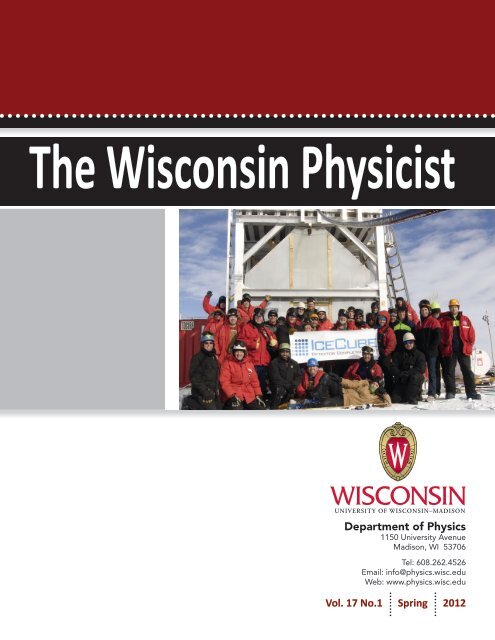
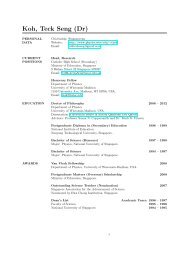
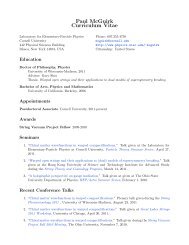
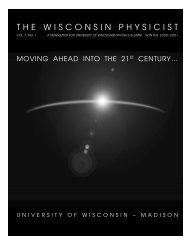
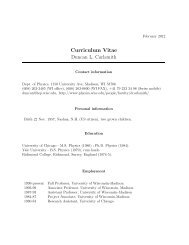
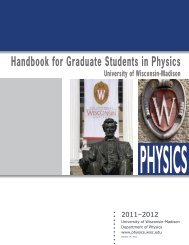

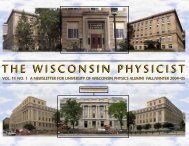
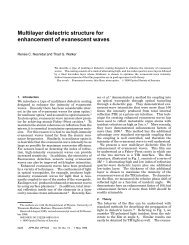
![The Symmetric Linear Potential [ ]](https://img.yumpu.com/25329322/1/190x245/the-symmetric-linear-potential-.jpg?quality=85)
